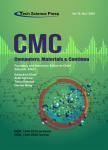A Novel Technique for Early Detection of COVID-19
作者机构:Department of Management Information SystemsFaculty of Economics and AdministrationKing Abdulaziz UniversityJeddah21589Saudi Arabia Faculty of Computer and Information SystemsIslamic University of MadinahAl MedinaSaudi Arabia
出 版 物:《Computers, Materials & Continua》 (计算机、材料和连续体(英文))
年 卷 期:2021年第68卷第8期
页 面:2283-2298页
核心收录:
学科分类:1002[医学-临床医学] 100214[医学-肿瘤学] 10[医学]
基 金:funded by the Deanship of Scientific Research(DSR)at King Abdulaziz University Jeddah under Grant No.GCV19-49-1441
主 题:COVID-19 classification feature selection dimensionality reduction chest CT deep learning deep convolutional neural network AIRRCNN
摘 要:COVID-19 is a global pandemic disease,which results from a dangerous coronavirus attack,and spreads aggressively through close contacts with infected people and *** far,there is not any prescribed line of treatment for COVID-19 *** to control the disease are very limited,partly due to the lack of knowledge about technologies which could be effectively used for early detection and control the *** detection of positive cases is critical in preventing further spread,achieving the herd immunity,and saving ***,so far we do not have effective toolkits to diagnose very early detection of the *** research findings have suggested that radiology images,such as X-rays,contain significant information to detect the presence of COVID-19 virus in early ***,to detect the presence of the disease in in very early stages from the X-ray images by the naked eye is not *** Intelligence(AI)techniques,machine learning in particular,are known to be very helpful in accurately diagnosing many diseases from radiology *** paper proposes an automatic technique to classify COVID-19 patients from their computerized tomography(CT)scan *** technique is known as Advanced Inception based Recurrent Residual Convolution Neural Network(AIRRCNN),which uses machine learning techniques for classifying *** focus on the Advanced Inception based Recurrent Residual Convolution Neural Network,because we do not find it being used in the ***,we conduct principal component analysis,which is used for dimensional *** results of our method have demonstrated an accuracy of about 99%,which is regarded to be very efficient.



